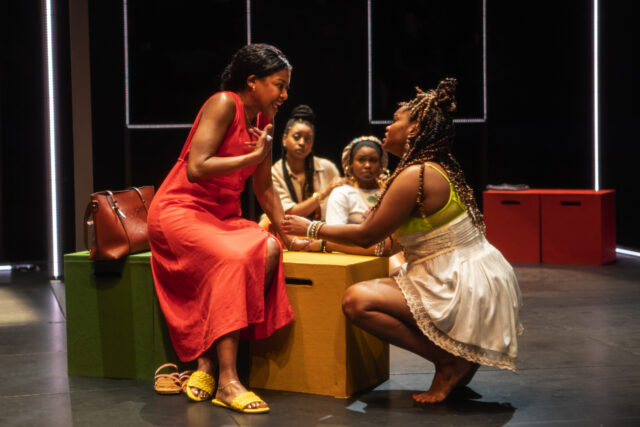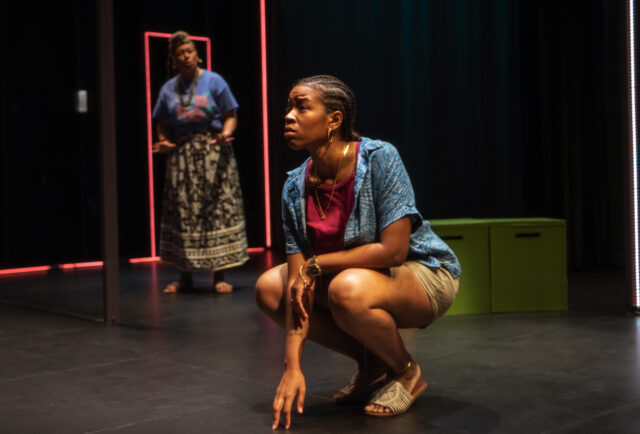
Sisters gather at the family home in Flatbush to figure out what happens next (photo by Monique Carboni)
BERNARDA’S DAUGHTERS
The Pershing Square Signature Center
The Romulus Linney Courtyard Theatre
480 West Forty-Second St. between Ninth & Tenth Aves.
Tuesday – Sunday through June 4, $37-$87
thenewgroup.org
www.nationalblacktheatre.org
Carlos J. Soto’s set is a harbinger of what is to come in the world premiere of Diane Exavier’s Bernarda’s Daughters, a powerful and moving coproduction from the New Group and National Black Theatre that opened at the Romulus Linney Courtyard Theatre at the Pershing Square Signature Center this week. The audience sits on three sides of the staging area, a sparse room with several painted wooden boxes on the floor and the skeleton of a house, with only the frames of doors and windows, occasionally illuminated in a string of LED lights. While it appears that the five protagonists in the title can leave at any moment, just walk through the empty doors or even climb through the windows, they are trapped by both fear and legacy. For ninety minutes the characters discuss their futures, but it always ends up with them back in the house, their life at a standstill.
Bernarda’s Daughters was inspired by Spanish poet and playwright Federico García Lorca’s last completed play, The House of Bernarda Alba, which he wrote in 1936, the year he died at the age of thirty-eight. First produced in 1945, the story has been adapted into a musical, an opera, a dance, and several films, with the location changing from Spain to Iran, India, Australia, the American south, and other places around the world, proving the universality of the themes.
Exavier’s version is set in modern-day Flatbush, Brooklyn (my hometown), where five sisters have gathered in the family home: Louise (Pascale Armand), Harriet (Alana Raquel Bowers), Lena (Kristin Dodson), Maryse (Malika Samuel), and Adela (Taji Senior). Their mother is in Haiti, attending the funeral of their father. The play begins with each sister delivering a brief introduction. For example, Louise, a city nurse who has a different mother but the same father as the other four, explains, “Each of us sisters is a room in our mother’s house, our grandmother a countryside. Intimate and immense. If you were to, say . . . put on a play about us, there would be no center-staged couch, no staircase, no fabrication of a gentrifying city just outside the windows, no nod to some ancestral land. Our city is dying and our city is inside of us. There are countries that are dying and those countries are inside of us. We are at the edge of living. We are the world we live in.”

Florence Delva (Tamara Tunie) is concerned about Adela (Taji Senior) in Bernarda’s Daughters (photo by Monique Carboni)
Outside, the noise of construction and protest pierces through their conversations; amid gentrification, there’s been another police shooting of a young, mentally ill, unarmed Black man. “They don’t see the people in the neighborhood. They live in those castles with the police as their front desk,” Adela says of the influx of white people flooding into the neighborhood. “They dial 911 like they’re out of toilet paper. ‘Excuse me, can you just?’ ‘Would you mind?’ It’s sick. I’m so tired of it.” Adela wants to join the march but can’t take action, instead watching it through the window, her face only a few feet from the audience, implicating us in what is happening to their community.
Louise and Harriet have a plan to use land their father left Louise in Jacmel, Haiti, to build a small vacation villa. They all discuss whether they will be moving out of the house — which their parents might have acquired under suspicious circumstances — or staying there with their grandmother, Florence Delva (Tamara Tunie), once their mother returns from her mourning period. When they find out what havoc their parents’ decisions have wrought, however, their lives are suddenly turned upside down.
“Louise, you know you can’t buy, you can’t rent, you can’t be dead here. Shit’s insane,” Adela says. Louise replies, “It’s ridiculous. Whatever happens, just don’t put me in Long Island.”
But as Adela says, “I feel like the house is killing us slowly. . . . You guys have to get out.”
Exavier fills the dialogue with poetic interludes and quotes based on writings and statements by James Baldwin, Louise Glück, Mary Ruefle, Trumbull Stickney, Morgan Parker, Kamau Brathwaite, Toni Morrison, and Florence Miller, whose husband was choked to death in Crown Heights by the police in 1978. In a compelling monologue about sex, sun, cats, and the dead, Maryse, who is a school librarian, says, “I love watching the sun on graves, illuminating names, how bright the light is, blazing the stone, and the sky so blue above recalling the color of bone.”
Later, Harriet says, “You really think I love love so much? You don’t know anything. I’m mourning it! I’m so far past love I never even stood a chance. I was born beyond it. We all were. Love — in this fucking country? My womb was full of rocks. That’s what bodies like ours think of love: babies made of stone. . . . I really think we are the end of it all. And I think that’s what makes us so goddamn American. Because this stupid country is like the waking end of a crazy-ass fever dream. And you trying to out-America everyone you lay down with because the only way to have a little power is to step on somebody else’s back is just wrong! But even worse than that, it’s useless.” Meanwhile, the words free and freedom appear seven times in the play, ideals that seem to be just out of the characters’ reach.
The actors portraying the sisters are outstanding, with native Brooklynite Dodson standing out as the boisterous Lena. The women believably argue and share personal intimacies like real sisters; however, Obie winner Tunie (Building the Wall, Familiar) has her hands full as the over-the-top Florence, who hearkens back to the old days in Haiti but is overdrawn here. The curtain at the rear of the stage feels unnecessary, but Rodrigo Muñoz’s costumes meld Brooklyn with Port-au-Prince, and Marika Kent’s lighting and Kathy Ruvuna’s sound are effective, particularly the never-ending commotion going on outside.
Directed by Dominique Rider with a clear connection to the characters, Bernarda’s Daughters is a potent look at what the Haitian community in New York City has, what it’s lost, and where it might be heading. Like Adela proclaims, “I keep telling you guys. It’s a different Brooklyn out there.” She’s not just talking about Flatbush.


